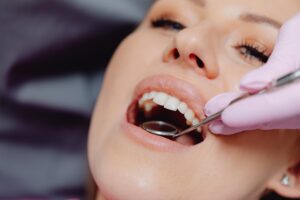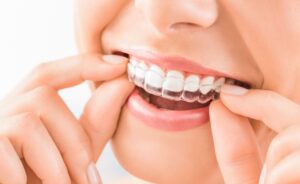Your child’s jaw and how it sits plays a role in their life. Misaligned bites can cause speaking difficulty or oral health complications, leading you to look for answers on how to fix these issues. But what is a deep bite vs. underbite? When should you seek treatments like underbite surgery or deep bite corrections? Here is a look at these jaw troubles and when you should see a dentist about them.
What Is an Underbite?
An underbite is when your lower jaw rests in front of your upper jaw while you have your mouth closed. Underbites can vary in severity, so you may be unable to detect them from the outside. Your kid may struggle with chewing food with a misaligned jaw. In severe cases, it can cause chipping or breakage to your front teeth.
What Causes an Underbite
Some ways an underbite can develop are:
- Genetics: Your child may have inherited the shape and size of your teeth from your family. If many of you or your spouse’s relatives have an underbite, it may be a genetic trait.
- Childhood Habits: Behaviors such as sucking the thumb or using a pacifier for an extended period may change the jaw’s shape. If your kid does these things in moderation, there is no need for concern.
- Injury: Trauma to the jaw can cause an underbite. If the healing process does not revert it to its original state, an underbite is likely to occur.
Health Effects Of an Underbite
Your child’s underbite can affect their health in many different aspects. Some effects include:
- Temporomandibular Joint Disorder (TMJ): This creates a feeling of lockjaw or popping sensations on the joints. Headaches, toothaches and dizziness can accompany it.
- Halitosis: Also known as chronic bad breath. An underbite can cause a bacterial infection in the mouth, causing halitosis.
- Heavy Snoring: It is possible an underbite can disrupt your kid’s sleep with heavy mouth breathing and snoring.
How To Treat an Underbite
Luckily, underbites can be treated at any severity. For children, the American Academy of Orthodontics suggests screening by the age of seven to address early detections. Treatments are often the most successful when done in childhood and pre-teen years of life. When seeing their dentist every six months for a cleaning and checkup, bring up any unmanageable symptoms of your kid’s underbite to find solutions.
Their treatment may require underbite surgery. It depends on how severe it is to determine the solution. It can look like this:
- Braces: In mild cases, braces can help straighten your child’s teeth and jaw. Seeing an orthodontist can get the balling rolling. After the doctor takes them off, be sure your kid wears their retainer to prevent any teeth from shifting.
- Facemask therapy: This device goes on your child’s face and rests on their chin and forehead. It uses elastics attached to the upper jaw and the device to pull the upper jaw forward. This treatment requires your kid to wear it 16 hours a day for a year, so be sure you can commit to it.
- Surgery: In severe cases, underbite surgery may be your only solution. It can correct the health issues from your child’s underbite and relieve pain. However, a doctor will only perform surgery once they’re done growing.
Remember — these treatments are here to enhance your kid’s oral health. Feeling nervous about taking the steps towards treatment is normal. Communicating with your child can ease anxieties when searching for the best solution.
What Is A Deep Bite?
You may have heard of a deep bite called an overbite — they are the same thing. A deep bite is when the front teeth overlap the row of bottom teeth too far while the mouth is closed. This typically occurs when your kid has a smaller or lower jaw than the upper one. Ignoring a deep bite can cause further issues down the road.
What Causes a Deep Bite?
A small lower jaw is the most common cause of overbite. The teeth of the lower jaw can continue to grow upwards until they hit the backs of the top teeth or the roof of the mouth. It can become overcrowded and cause alignment problems. There are also other ways of developing a deep bite, such as:
- Losing Teeth: Losing baby teeth early or losing your adult teeth can cause your teeth to shift.
- Childhood Habits: Any prolonged behavior that encourages pushing teeth out of alignment can be the cause. If behaviors such as thumb or lip sucking persist past age five, an overbite may be a concern.
- Overly Developed Muscles: The muscle in your jaw can be extremely strong. Children who frequently clench or bite down hard with their teeth can develop these muscles, causing a deep bite.
Health Effects Of a Deep Bite
You should not ignore deep bites. They can cause significant health issues down the road if you do. Some health effects of a deep bite can include:
- Gum Recession and Periodontal Disease: When a kid with a deep bite grinds their teeth, it can tear at the gum tissue around them. This can allow bacteria and food to get in and cause gum infections. In severe cases, it can even cause tooth loss.
- Sores and Ulcers: If a deep bite is severe enough, it may scrape the roof of the mouth, causing sores and ulcers. They can be extremely painful, so using ways to calm the pain in the meantime may be necessary.
- Temporomandibular Joint Disorder (TMJ): A deep bite can put your kid’s muscles in an unnatural position. The joints may get stressed and cause damage to the cartilage and bone over time.
How To Treat a Deep Bite
Deep bites are best treated early on in life. However, it can feel daunting for your child to go and get deep bite correction. Try bringing a distraction to your procedure or look for relaxation techniques to ease their mind.
An orthodontist can perform deep bit correction in a variety of ways. If surgery is necessary, they use methods to move the upper and lower front teeth into the supporting bone and the back teeth can be elongated. Other popular treatments — such as braces and clear aligners — can move teeth back into their proper position.
Healing a Deep Bite vs. Underbite
Underbites and deep bites are essential to treat in your kids. Teeth are vital to survival and you want to ensure your children keep their originals for as long as possible. When looking to treat a deep bite vs. underbite, keep an eye on your kid’s jaw and talk to their dentist as soon as you have concerns. You could be preventing a host of future problems by doing so.








